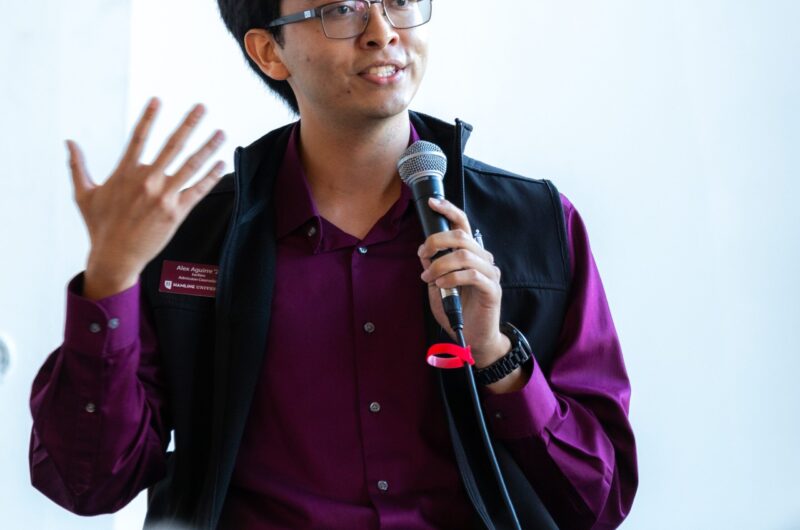The blog series: Real Talk: Being a POC at a PWI spotlights the untold stories and experiences of students of color in the College Success Program. These stories are not indicative of every student of color’s experience at their PWI. However, other students of color reading may find parallels in these accounts due to having similar experiences at their respective campuses. Every person’s story carries value in the holistic experience colleges have to offer .Thank you, Yureimy, for boldly sharing your story about being a student of color at UT Austin with us.
What was your initial reasoning for attending UT Austin?
I chose UT Austin because it is a “prestigious” university and it is close to home so I could commute there. I am a first generation college student so going away for college seemed like a really crazy and scary thing for my family and I. Going to UT allowed for me to still live with my parents and not have the extra weight of bills and financial problems. My parents paid for everything such as food and gas which allowed me to focus on school.
What’s your impression of the UT after a semester/year there?
UT really pushes you academically and expands your mindset. Most professors are intelligent and ask profound questions that make you think. It is also not as diverse as I imagined it would be. It’s not as diverse as I imagined because my classes were filled with mostly white people. Even while walking to other classes I would mostly see white people and not much diversity.
So that was another reason why it was hard to make friends. I couldn’t really relate to them. Growing up I’ve never been around many white people so I never know what we could relate on. They have always seemed so different from me because I’m really in touch with my Mexican culture which I feel is so different from them. I also feel like they couldn’t relate to the struggles of being a first generation college student and a person of color.
During my classes and while walking to my classes I noticed that there’s not many Latinx people around campus. I think that’s where I started to develop my imposter syndrome.
When did you start to notice UT wasn’t doing its part to be inclusive of your community?
During my classes and while walking to my classes I noticed that there’s not many Latinx people around campus. I think that’s where I started to develop my imposter syndrome. Not many looked like me. UT has some Latinx organizations where you can meet other people in the Latinx community but it was hard for me to get involved in those organizations since I live at home.
Those organizations also host Latinx events but I could never find the time to go between classes, commuting, and homework. The classes that talk about my heritage are very hard to get into because there is limited space and many others that want to take those classes so I have not had the opportunity to take them. I’m sure there are many other events that I missed due to not being on campus very often.
How your school’s inclusion (or lack of) impacted your experience thus far (academically, socially, etc.)?
Well like I said before, I developed Imposter Syndrome which is where I felt like I didn’t really belong at UT. I felt like I didn’t belong because everyone seemed so much smarter than me and they seem to know what they were doing. They seem so comfortable being at UT and so sure of themselves meanwhile I often questioned whether I belonged. Being the first in my family to go to college strengthened this belief. I didn’t even bother to make friends my first year of college because I didn’t feel like I could relate to anyone that was there. Luckily, I did make one friend in my economics class who was from Mexico and struggled with the class like I did. She made it easier to get through my last semester and my economics class. I have heard of clubs and organizations that represent my community but commuting to UT from home made it hard to join anything.
The people that I’ve met have been very friendly and it helps knowing I’m not the only one struggling with imposter syndrome.
What advice would you share with prospective students?
Don’t get discouraged and feel like you don’t belong just because you don’t see many other students like you. You will eventually find your group of friends, or even just one friend that will remind you that you do belong.
What steps can universities take to combat lack of inclusion?
Encourage more minorities to apply to these “prestigious” universities and show them they do have a spot at the university. I feel like many of us are reluctant to even apply to these universities which is where our imposter syndrome starts.
Is there anything more you’d like to share about your experience?
Being challenged academically has shown me my potential and has shown me I’m capable of a lot more than I imagined. The professors I’ve had have been very accessible and helpful when it came to helping me better understand their class.
The people that I’ve met have been very friendly and it helps knowing I’m not the only one struggling with imposter syndrome. Moreover, I’m glad I can still live with my parents while going to UT because they are such a great support and I would not be able to handle so many changes at once. I’m glad I chose The University of Texas at Austin.
Yureimy is the second UT Austin student to be highlighted in our blog, check out the first student’s story here.



